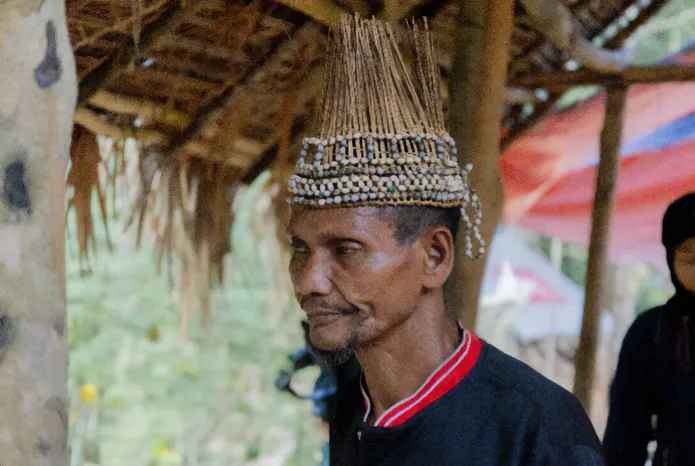Batek People & Social Change
Noor Shamsarini Md Isa
Upon our arrival to Dedari Village along the Sungai Tembeling riverside, I first observed the ordinary existence of the Batek people, residing in wooden houses constructed from wooden materials sourced from the jungle, with roofs fashioned from palm leaves. 18 families live in the village and one of the attractions was the children who were playing in the village yard. We were welcomed by Pak Cik Sena, the head of the village of Kampung Dedari. He informed us that this is the final group of traditional Batek people living in Pahang National Park. He subsequently proceeded to demonstrate several indigenous talents, like igniting fires from wood, hunting animals with little tools such as a “sumpit,” and showcasing traditional Batek accessories crafted from local materials. There is a modest community hall in the village, equipped with a long bench for visitors to sit and listen to his words. The Batek people are known historically as a nomadic group; according to Pak Cik Sena, they were relocated from their original settlement based on various factors, including resource availability (particularly food), floods, natural disasters, and death (casualties) of family members. The demise of cherished family members has resulted in grief, prompting the family to relocate. The encroachment is also among the reason these individuals now inhabit Pahang National Park. In 2000, it was reported that just 1,519 Batek individuals remained in the whole Malay Peninsula.
A narrow road has been opened at the back of the village, primarily utilized for transportation, particularly for sending their children to school. The majority of the Batek population receives formal education starting at the age of seven, like other ethnic groups in Malaysia. Another kind of transportation I observed is the boat, which has also been provided by the government to stimulate commercial operations. Some members of the Batek community have been trained as tour guides by the government. Interestingly, according to Pak Cik Sena, although the Batek people receive education and economic assistance from the government, they exhibit considerable reluctance to leave their villages. He indicated to his son, stating, “That is my son (pointing to adult age around 20s); he works in Klang (Selangor) in the landscaping sector. However, he will be there for only two or three weeks before returning. He will never permanently leave the village.”
Regarding consumption, Pak Cik Sena stated that the arrival of goods such as rice, sugar, and coffee etc. has generated a demand for these items for Batek people. This, he asserts, sparked their interest in economic matters. He told that the Batek people often utilize the resources available in the bush for their consumption before the introduction of these commodities into their daily life by having contact with local shops nearby.
The demand for money also arises from the government's conversion of this group into cultural products of tourism industry. In addition, Pak Cik Sena argued that they can no longer venture into the bush, particularly to pursue their hunting and gathering occupations, as they must now remain at home awaiting visitors.
Beyond the cultural tradition that eventually transforms into commercial activity, there are intriguing aspects regarding the Batek people’s social transformations. While traversing the settlement, I observed a substantial expanse of land allocated for banana cultivation. According to Pak Cik Sena, this is supplied by government agencies, consisting of almost hundreds of banana plants. Upon enquiring if this tree originates from certain native species of Pahang’s jungle, he said that it does not, and the Batek people are exploring ways to commercialize this crop in the future. Upon further investigation, he revealed that there were only a few rubber trees in his village and stated that the government once provided 2000 trees for the intention of rejuvenating the village’s economy. However, due to a lack of understanding regarding the economic potential of these trees, they essentially distributed them to nearby villagers upon request. He then lamented, “I was not the leader at that time; it was my father and the elders…Only these two lefts” (pointing to the tree next to him).

The concept of capitalism, together with the introduction of currency and goods used by contemporary society, can impact even the most isolated individuals, regardless of their ethnic or religious backgrounds. The modernization process is evident, even for the most isolated and secluded ethnic communities. Before we departed from the village, one of the tour guides informed me, “These are the challenges we have here. Numerous international tourists assert that the Batek people are no longer authentic. The problem is, if we permit them to remain in their natural conditions, the tourism industry will cease to exist”. The pursuit of identifying the “most” original group of a specific ethnicity is increasing; however, it contradicts the economic advantages presented by the tourism sector.


